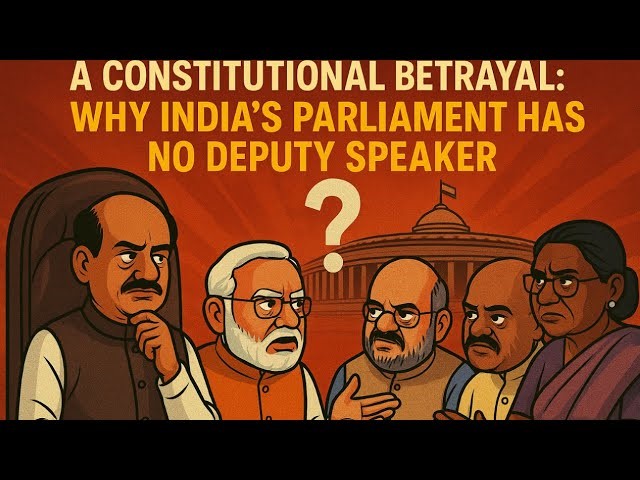Deputy Speaker Vacancy Raises Constitutional Concerns
Deputy Speaker Vacancy Raises Constitutional Concerns
Why in the News?
The Deputy Speaker’s post in Lok Sabha has remained vacant since 2019, raising constitutional and democratic concerns. Despite Article 93 mandating early election, the government has shown reluctance in the election of Deputy Speaker, sparking debates on the erosion of parliamentary norms and Opposition exclusion. This situation highlights the importance of constitutional conventions and the role of rules in maintaining democracy in India. The absence of a present Deputy Speaker of Lok Sabha 2024 underscores the need for addressing this constitutional imperative, which is crucial for effective legislative work.
Constitutional Mandate and Role of Deputy Speaker
- Article 93 of the Constitution, adopted on 26 January 1950 (Constitution adoption date), mandates the election of a Deputy Speaker of Lok Sabha “as soon as may be”, implying urgency, not discretion.
- The Speaker and Deputy Speaker are crucial for ensuring legislative continuity, presiding over debates and important House committees as presiding officers. Their role is somewhat analogous to the Deputy President of India in terms of constitutional significance.
- Under Article 94, the Deputy Speaker remains in office until resignation, removal, or disqualification.
- As per Article 180, the Deputy Speaker steps in if the Speaker’s office becomes vacant or inactive, acting as a presiding officer in the absence of the Speaker.
Convention, Parliamentary Practice and Current Scenario
- By constitutional convention, the Deputy Speaker’s post is offered to the Opposition, promoting bipartisan cooperation and power sharing in the legislative work of Lok Sabha.
- The 17th Lok Sabha (2019–24) did not appoint a Deputy Speaker, and signs suggest the 18th Lok Sabha may follow the same path, creating a potential constitutional vacuum. This situation has implications for the Deputy Speaker UPSC syllabus, highlighting the importance of understanding these roles in governance.
- This reflects a growing centralisation of power in the ruling party, sidelining the role of opposition in democracy and weakening parliamentary opposition. The absence of a Deputy Speaker impacts the overall effectiveness of the Speaker’s role in managing parliamentary proceedings.
Democratic Impact and Need for Restoration
- Prolonged vacancy violates Articles 93, 94, and 180, and Rule 8 of Lok Sabha rules, undermining the importance of Rules of Procedure in maintaining institutional balance. This raises questions about constitutional morality and the democratic intent behind these provisions.
- It risks creating a constitutional crisis, undermining Westminster norms of shared governance and effective deliberation. The absence of a new Lok Sabha Speaker or Deputy Speaker could have serious constitutional implications for the functioning of the parliament and its legislative work.
- Failure to honour constitutional conventions weakens democratic resilience and consensus-driven politics in India’s parliamentary democracy. This situation draws parallels with issues of corporate governance, where the absence of key roles can lead to institutional imbalance.
The absence of a Deputy Speaker in the Lok Sabha raises significant concerns about constitutional accountability and the health of deliberative democracy in India. This situation underscores the need for checks and balances in our democratic system and highlights the importance of upholding constitutional imperatives. As we move forward, it is crucial to address this issue to ensure the proper functioning of our parliamentary committees and maintain the integrity of our legislative processes. The restoration of this role is essential for promoting bipartisan cooperation and maintaining the spirit of consensus-driven politics that is vital for a robust democracy, much like how effective corporate governance is crucial for organizational success.
Convention, Parliamentary Practice and Current Scenario
- By constitutional convention and to promote bipartisan cooperation, the Deputy Speaker’s post is offered to the Opposition, fostering power-sharing in the work of Lok Sabha.
- The 17th Lok Sabha (2019–24) did not appoint a Deputy Speaker, and signs suggest the 18th Lok Sabha may follow the same path, creating a potential constitutional vacuum and raising questions about when a new Lok Sabha Speaker might address this issue.
- This reflects a growing centralization of power, which could potentially undermine the effectiveness of the Speaker’s role and the overall democratic process.







